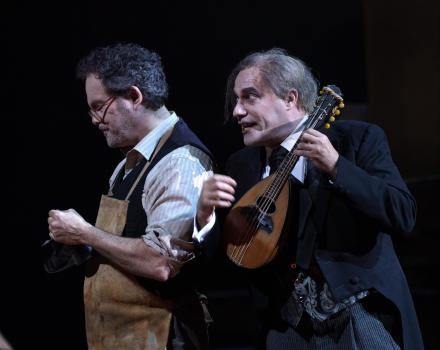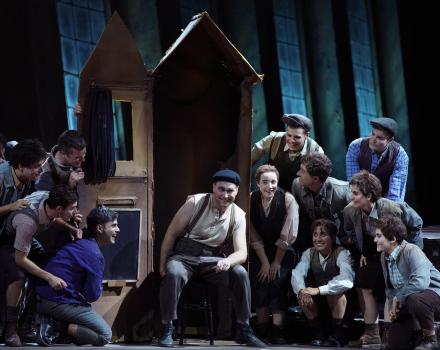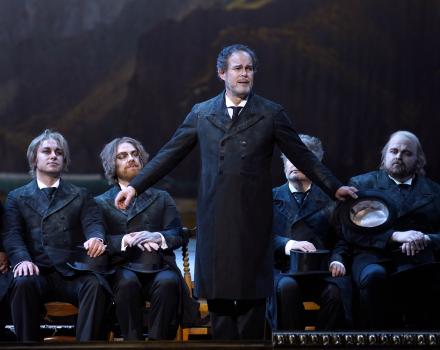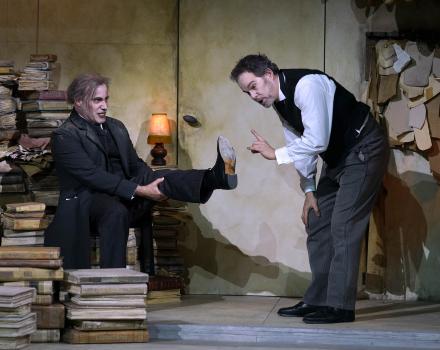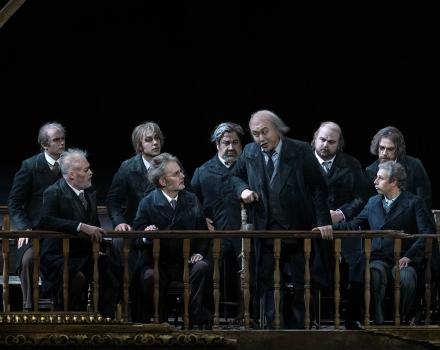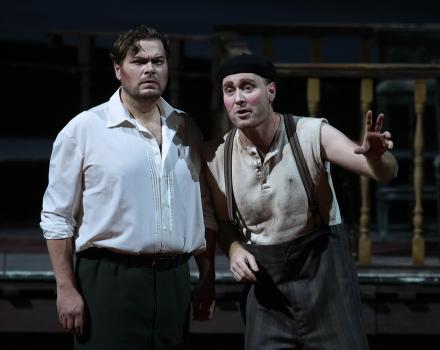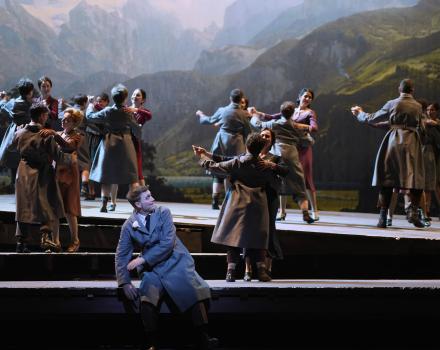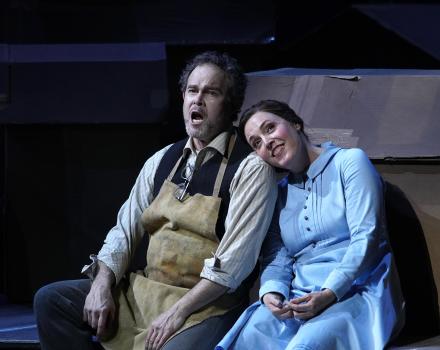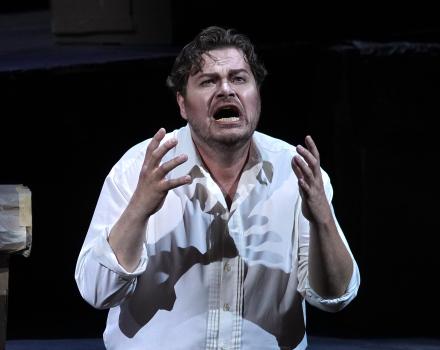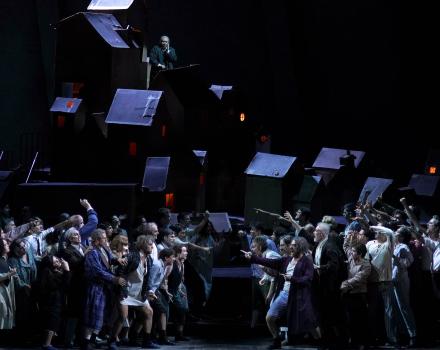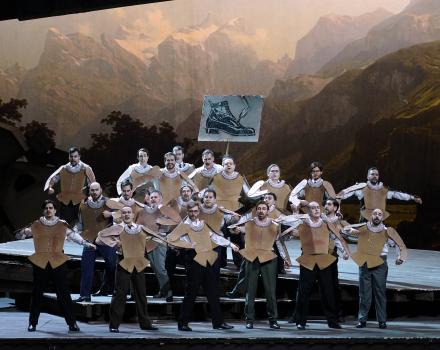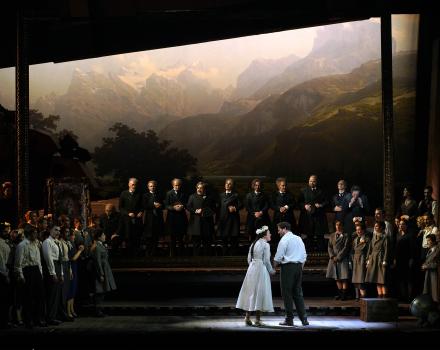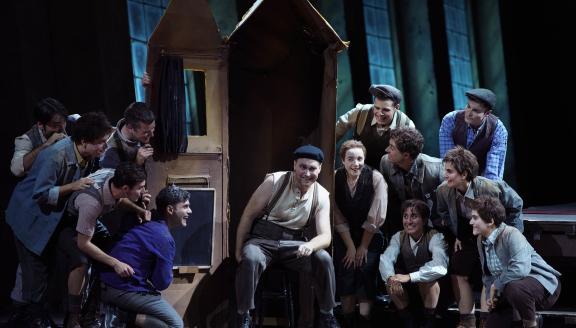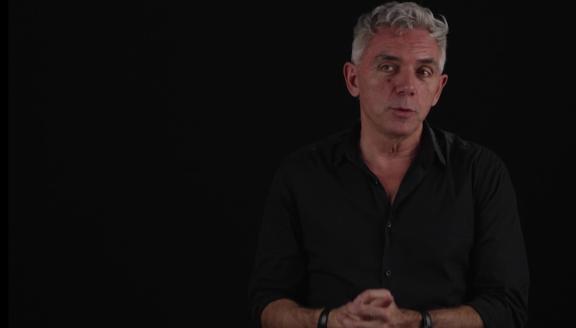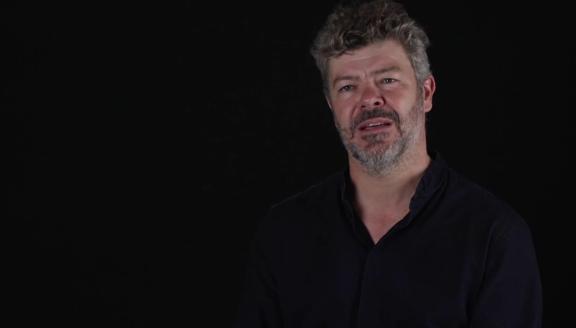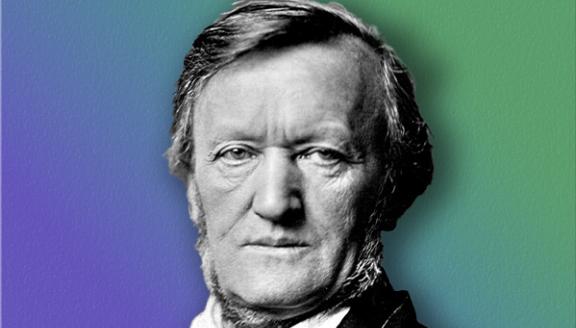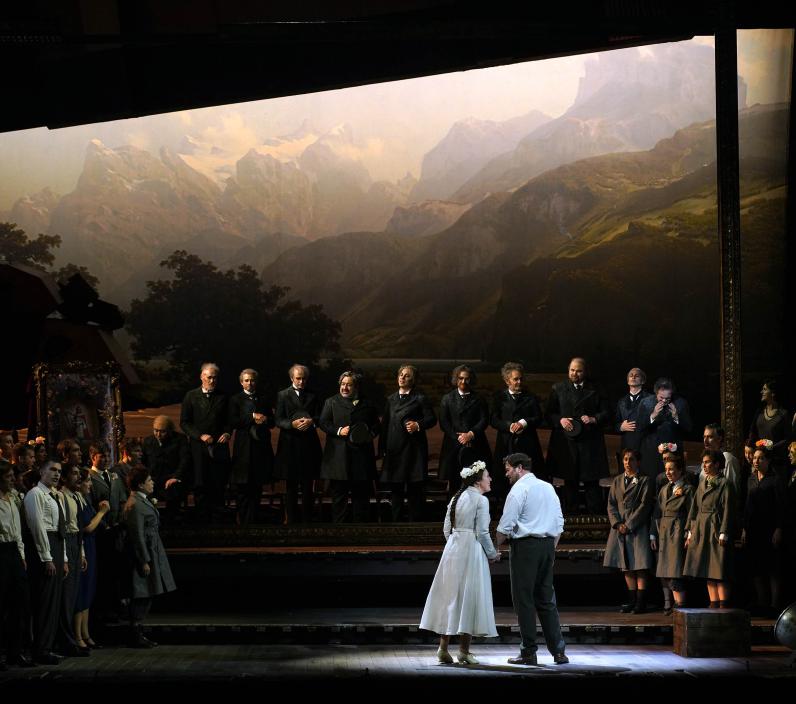
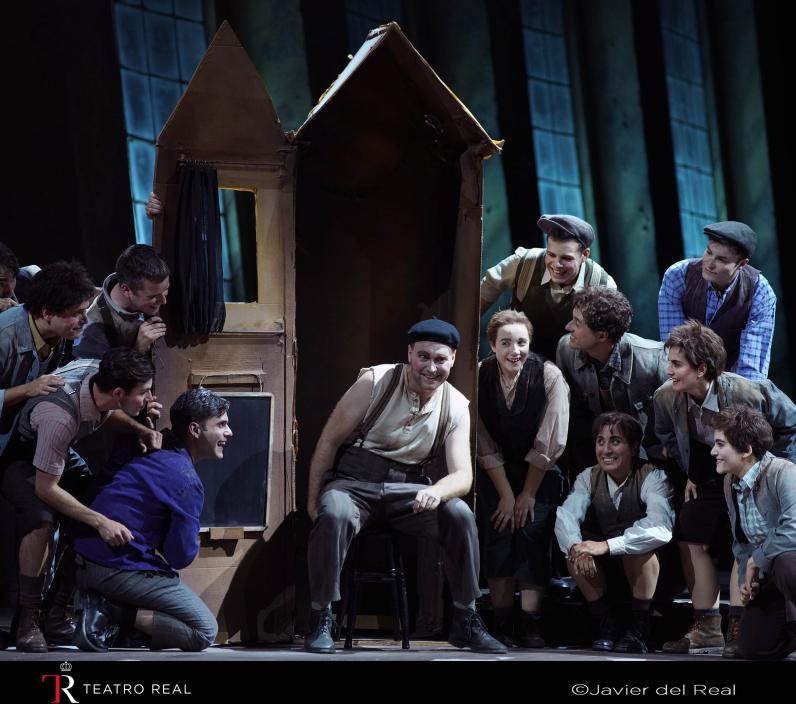
Midsummer's eve in Nuremberg and the real-life cobbler-poet Hans Sachs and the guild of mastersingers are pursuing their craft of poetry and music according to traditions and rules. A goldsmith's daughter, Eva, and a knight, Walther von Stolzing, fall in love, but Eva's father has promised her to the winner in the forthcoming song contest. Under the wise tuition of Sachs, can Walther learn the mastersinger's art in time to win Eva’s hand and see off a challenge from the foolish town clerk Beckmesser?
Richard Wagner’s only comic opera had a long gestation. Summer 1845: drawing on the History of German Literature as well as the biography of poet and shoemaker Hans Sachs, the composer sketches out ideas for a satirical counterpart to Tannhäuser. Autumn 1861: Wagner writes to his publisher that he intends to cheer himself up with ‘something lighter’ and begins composing Die Meistersinger, which he would not complete until six years later. With a sense of self-derision with which he is not usually associated, Wagner brings together an exercise in style and an aesthetic manifesto in praise of the ‘noble and holy German art!’. Here is an opera that speaks volumes about the composer’s own preoccupations: the widening divide between high art and popular culture, and the fracturing of tradition by the radically new. Wise and audacious, the characters of Sachs and Walther can be seen as a double self-portrait of their creator. OperaVision shares live Teatro Real’s new production (the first in Madrid for 22 years) which is conducted by Pablo Heras-Casado and staged by a director with some gift for comedy, Laurent Pelly.
Cast
|
Hans Sachs
|
Gerald Finley
|
|---|---|
|
Veit Pogner
|
Jongmin Park
|
|
Kunz Vogelgesang
|
Paul Schweinester
|
|
Konrad Nachtigal
|
Barnaby Rea
|
|
Sixtus Beckmesser
|
Leigh Melrose
|
|
Fritz Kothner
|
José Antonio López
|
|
Balthasar Zorn
|
Albert Casals
|
|
Ulrich Eisslinger
|
Kyle van Schoonhoven
|
|
Augustin Moser
|
Jorge Rodríguez- Norton
|
|
Hermann Ortel
|
Bjørn Waag
|
|
Hans Schwarz
|
Valeriano Lanchas
|
|
Hans Foltz
|
Frederic Jost
|
|
Walther von Stolzing
|
Tomislav Mužek
|
|
David
|
Sebastian Kohlhepp
|
|
Eva
|
Nicole Chevalier
|
|
Magdalene
|
Anna Lapkovskaja
|
|
Sereno
|
Alexander Tsymbalyuk
|
|
Chorus
|
Teatro Real Chorus
|
|
Orchestra
|
Teatro Real Orchestra
|
| ... | |
|
Music and text
|
Richard Wagner
|
|---|---|
|
Conductor
|
Pablo Heras-Casado
|
|
Director
|
Laurent Pelly
|
|
Costumes
|
Laurent Pelly
Jean-Jacques Delmotte
|
|
Sets
|
Caroline Ginet
|
|
Lighting
|
Urs Schönebaum
|
|
Chorus master
|
José Luis Basso
|
| ... | |
Videos
STORY
Act I
In St. Catherine’s Church in Nuremberg, where a religious service is ending. One of the parishioners is goldsmith Veit Pogner’s daughter, Eva, who is being watched over by her maid Magdalene. Walther von Stolzing, a young man from a nearby town in Franconia, steals furtive glances at Eva, which the young woman is pleased to receive. They met by chance the day before, and it was love at first sight. Walther wants to speak with Eva, and she sneaks away from Magdalene for a moment to have a conversation with him. When she sees them, Magdalene reminds Eva that her father has already promised her hand in marriage to the winner of a song contest to be held in celebration of St. John’s Day. This news distresses Walther, since he doesn’t know what it’s about.
David, an apprentice to cobbler Hans Sachs and Magdalene’s lover, prepares the venue for a meeting of mastersingers, and he explains the rules of the competition to Walther. David launches into a long explanation of the contest, since Walther has promised Eva that he will enter and win her hand. One by one, the mastersingers file into the church, each representing a trade: furrier Kunz Vogelgesang, tinsmith Konrad Nachtigal, town clerk Sixtus Beckmesser, baker Fritz Kothner, pewterer Balthasar Zorn, grocer Ulrich Eisslinger, tailor Augustin Moser, soapmaker Hermann Ortel, stocking weaver Hans Schwarz, and coppersmith Hans Foltz. Eva’s father is also there, and the last to arrive is cobbler Hans Sachs.
Beckmesser is keen to be with Eva, but upon observing Pogner’s interest in the new candidate, he realises that the young man is a rival who must be eliminated at all costs. The mastersingers voice their opinions and discuss how the contest will be held. Pogner confirms that he will give his daughter’s hand in marriage to the winner, and that if Eva rejects him, she won’t be able to choose another contestant. Walther asks for a preliminary song trial. In his enthusiastic song, he describes his wonderful evenings in front of the fireplace, reading works by his favourite poet, and the pleasures of horseback riding in the spring to enjoy nature. Beckmesser tallies the errors in Walther’s composition and points them out to him. Sachs sympathises with Walther’s enthusiasm and remains pensive while the others leave the room.
Act II
On a Nuremberg street where the homes of Sachs and Pogner are across from one another, evening falls. David informs Magdalene of Walther’s failure. There is a dispute between the apprentices, requiring Sachs to intervene and calm them down. Pogner and Eva are relaxing under some linden trees that provide shade to their home. The father assures his daughter that if she doesn’t accept the winning poet, she can always choose another one, provided that he’s a mastersinger.
Sachs, carried away by the warm, pleasant summer night, reflects on the beauty and power of music and song in a splendid monologue. Eva goes into his workshop. There is a great friendship and mutual understanding between them, and despite the age difference, there is also a latent yet unexpressed emotional connection. Sachs quickly detects the young woman’s attraction to the aspiring mastersinger. Walther appears on the street, and the couple spontaneously embrace. Then Beckmesser walks down the street, lute in hand, ready to serenade Eva. As soon as he begins, an annoying sound can be heard from Sach’s workshop. Beckmesser is unable to concentrate, nor can his song be heard. The town clerk is furious.
Meanwhile, Beckmesser asks Sachs for his opinion on the song he’s composing for the contest. With quite a bit of pleasure, the cobbler points out a multitude of errors, which Beckmesser is forced to reluctantly accept. Soft strokes of the lute resume. The serenade begins and is echoed by knocks yet again, which Sachs is making from his workshop to mark each error. Beckmesser begins to sing louder, and Sachs’s knocking also gets louder. There is so much racket that it awakens all the neighbours, who complain. Taking advantage of the confusion, Walther and Eva prepare to run away together, but Sachs, who hasn’t taken his eyes off them, intervenes. The shouts turn into a riot, and nobody knows what is happening or why. Nobody knows where the fracas is going, but they all join in.
Act III
In Sachs’s workshop, David trains as an apprentice. Walther shows up, ready to prepare his song with Sachs as a last resort. Sachs advises him, praising him where appropriate and correcting him when necessary. The meddlesome Beckmesser reappears before Walther has finished correcting the poem. It doesn’t take long for the town clerk to notice the unfinished verses on the table. Suspicious by nature, he infers that Sachs is their author and could be planning to enter the contest to win Eva’s hand. When he gets his chance, he steals the composition.
All of Nuremberg has gathered in a meadow outside the city, decorated with market stalls and a grandstand. There is a procession led by the cobblers’ guild and followed by representatives of all the other trades. Sachs makes a speech praising Pogner for giving his daughter’s hand to the winner. Beckmesser is invited to sing his song. He hasn’t fully learned or understood the stolen verses, and with his bumbling and hesitation, he draws irritation and laughter from the crowd, who can’t understand how he could have dared to enter. Then it’s Walther’s turn. He captivates the audience from the outset. His song is poetic and beautiful, complying with the mastersingers’ strict rules. Amid applause, a radiant Eva awards him the prize. She takes the crown from Walther and places it on Sachs’s head. Then Sachs takes a gold medal from Pogner and puts it around Walther’s neck. All of them sing, hailing Sachs, and in a final choral apotheosis, a hymn is performed to glorify German sacred art.
Gallery
